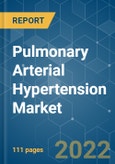Pulmonary arterial hypertension is a group of rare and life-threatening diseases that leads to increased pulmonary arterial pressure and localized hypertension, which can result in heart failure. The increasing prevalence of pulmonary arterial hypertension, government support for the development of orphan drugs and the growing geriatric population are the main factors that are boosting the growth of the pulmonary arterial hypertension market. According to the World Health Organization (WHO), between 2015 and 2050, the proportion of the world's population over 60 years will nearly double from 12% to 22%. The symptoms of Pulmonary arterial hypertension include shortness of breath (dyspnea) especially during exercise, chest pain, and fainting. The increase in the number of geriatrics leads to consequences which is several cases includes complications related to pulmonary arterial hypertensions. The technological advancements are also steadily focusing upon identification of new molecular pathways which contributes to developement of better treatments possible over the forecast period. All these factors boost the growth of the market.
However, patent expiration of drug molecule and side effects associated with the drugs is expected to impede the growth of the global market in the forecast period.
Key Market Trends
Prostacyclin and Prostacyclin Analogs Segment is Expected to Observe Better Growth Over the Forecast Period
Based on drug class, the market is segmented into Prostacyclin and Prostacyclin Analogs, Calcium Channel Blockers, Phosphodiesterase 5 (PDE-5), Endothelin Receptor Antagonists (ERA) and Others. Prostacyclin and Prostacyclin Analogs segment is expected to show better growth in the forecast period, owing to the high sales of these drugs and rising number of drug approvals. According to the National Organization for Rare Disorders, new cases are estimated to occur in one to two individuals per million each year in the U.S. The incidence is estimated to be similar in Europe. Pulmonary hypertension occurs at all ages, and the incidence of it increases with age. The high growth is attributed to changing lifestyle, in terms of lack of physical activity and increased consumption of alcohol and tobacco, which increases the chances of developing hypertension and high blood pressure. The increased blood pressure in turn, gives rise to various diseases such as stroke and heart attacks. Hypertension is considered as a variable health risk and is often related to high morbidity and mortality.
North America is Estimated to Lead the Pulmonary Arterial Hypertension Market
North America leads the Pulmonary Arterial Hypertension (PAH) Market, owing to the presence of the highly developed healthcare sector, along with the rising prevalence of infectious and chronic diseases. About 200,000 hospitalizations occur annually in the United States with pulmonary hypertension. Moreover, increased awareness, high diagnosis rate, and supportive government initiatives such as the Rare Disease Act 2002 and The Orphan Drug Act (ODA) 1983 will support the market growth. There are certain useful developments shown by the companies and supported by the government related to pulmonary arterial hypertension activities. In 2019, Bayer announced recipients of the inaugural Pulmonary Hypertension Accelerated Bayer (PHAB) Awards, a U.S.-based research grant program created to support clinical research in pulmonary, which is expected to drive the pulmonary arterial hypertension market in the forecast period.
Competitive Landscape
The leading players in the global market for Pulmonary Arterial Hypertension are - Arena Pharmaceuticals, Bayer AG, Bristol-Myers Squibb Company, Gilead Sciences, Inc., GlaxoSmithKline Plc, Johnson & Johnson (Actelion Pharmaceuticals, Ltd.), Merck & Co. Inc., Novartis International AG, Pfizer, Inc., and United Therapeutics Corporation.
Additional Benefits:
- The market estimate (ME) sheet in Excel format
- 3 months of analyst support
This product will be delivered within 2 business days.
Table of Contents
Companies Mentioned (Partial List)
A selection of companies mentioned in this report includes, but is not limited to:
- Arena Pharmaceuticals
- Bayer AG
- Bristol-Myers Squibb Company
- Gilead Sciences, Inc.
- GlaxoSmithKline Plc
- Johnson & Johnson (Actelion Pharmaceuticals, Ltd.)
- Merck & Co. Inc.
- Novartis International AG
- Pfizer, Inc.
- United Therapeutics Corporation
Methodology

LOADING...








